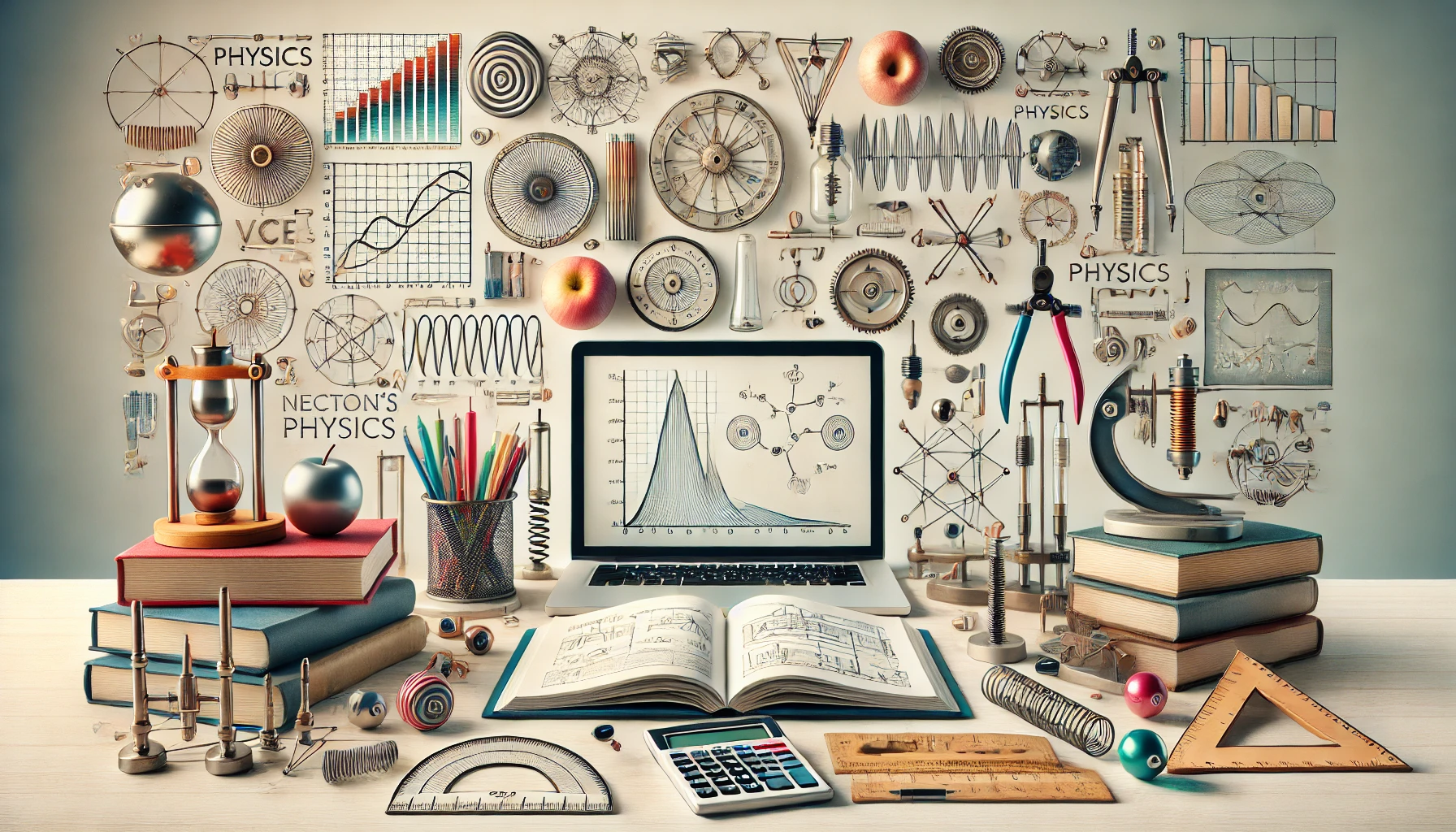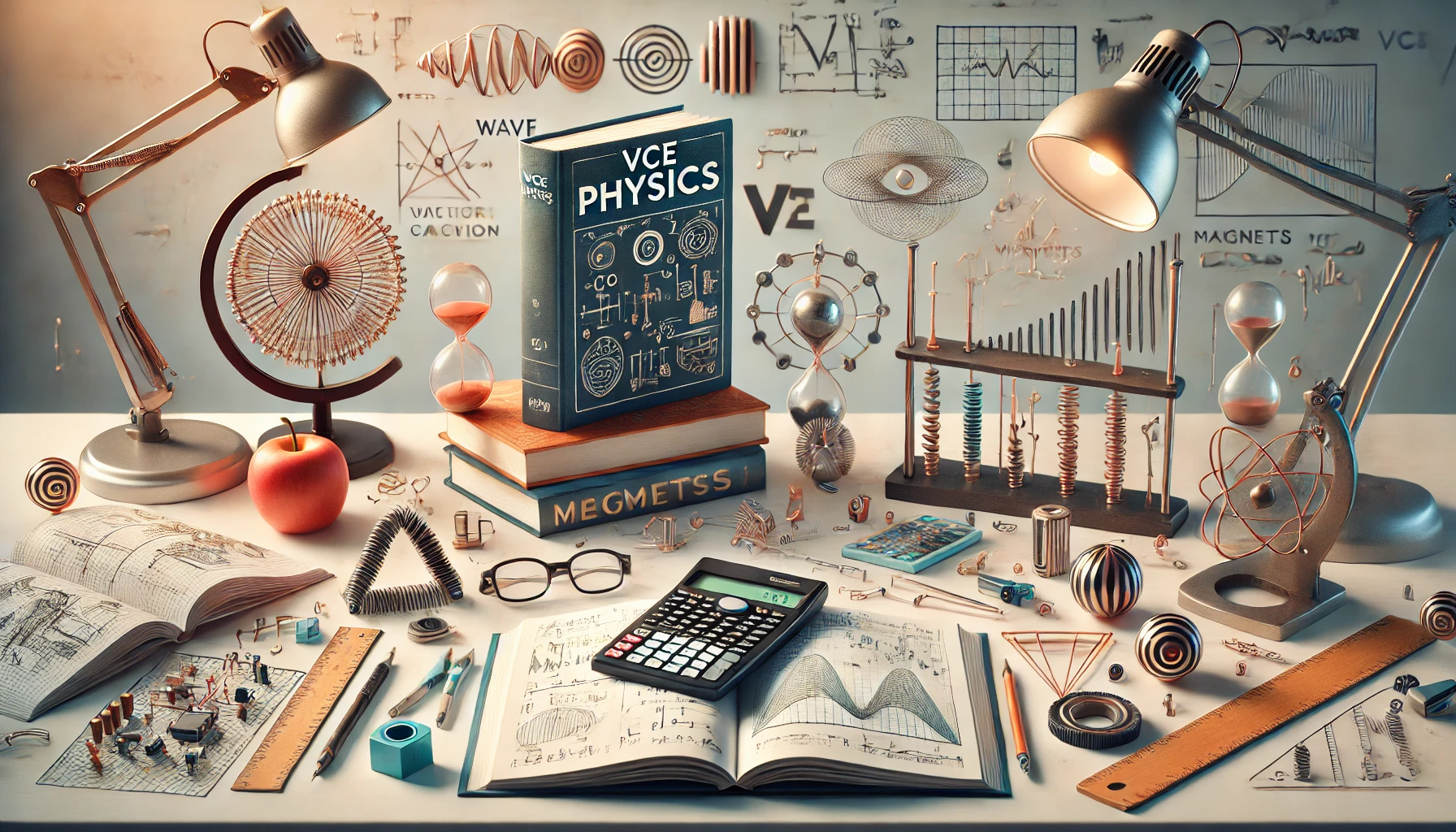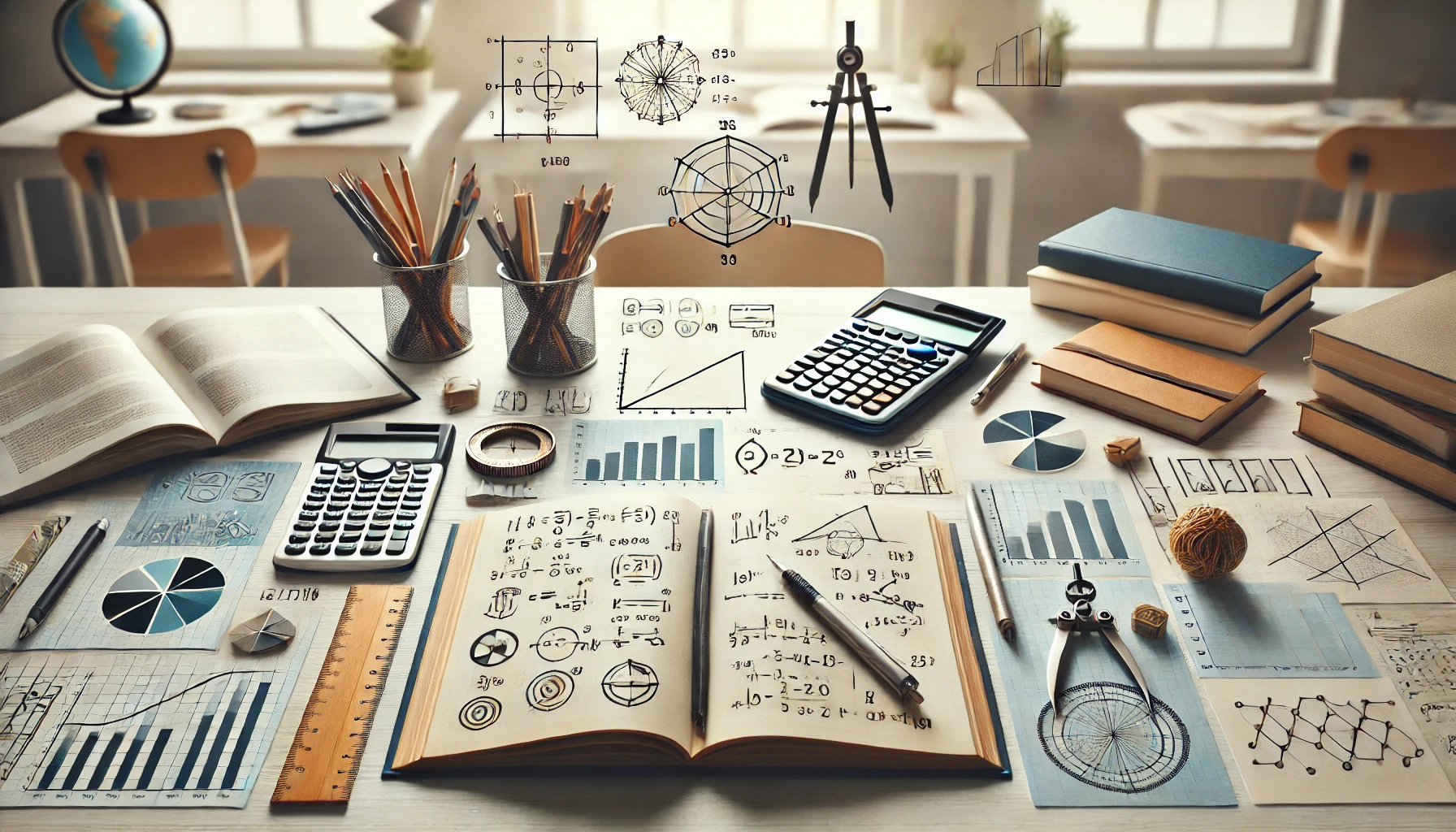
VCE Physics explores the fundamental principles that govern the natural world—from motion and energy to electricity, waves, and the nature of matter. It helps students understand how the universe works, while building strong skills in problem-solving, mathematical reasoning, and experimental analysis.
What topics are covered in VCE Physics?
VCE Physics is divided into four units, each focusing on different areas of classical and modern physics. The subject builds progressively across Year 11 (Units 1 and 2) and Year 12 (Units 3 and 4), combining theoretical understanding with practical investigation.
Units 1 & 2 (Year 11)
Unit 1: How is energy useful to society?
- Thermal energy and thermodynamics
- Electricity generation and transmission
- Nuclear energy and radioactivity
- Energy efficiency and sustainability
- Student-designed investigation on energy production or use
Unit 2: How does physics help us to understand the world?
- Motion and forces (Newtonian physics)
- Momentum, energy conservation
- Wave phenomena: sound and light
- Fields and motion in space
- Optional exploration topic (e.g., flight, medical imaging, sports physics)
- Student-designed practical investigation
Units 3 & 4 (Year 12)
Unit 3: How do fields explain motion and electricity?
- Gravitational fields and circular motion
- Electric fields, electric circuits
- Magnetic fields and motion of charged particles
- Newton’s laws in field contexts
- The generation and transmission of electricity
Unit 4: How can two contradictory models explain both light and matter?
- Wave-particle duality of light and matter
- Interference and diffraction
- The quantum nature of light
- Special relativity
- The structure of the atom and nuclear models
- Extended student-designed practical investigation
Each unit places a strong emphasis on both conceptual understanding and scientific investigation, preparing students for advanced studies in science, technology, engineering, or health disciplines.
Why study VCE Physics?
VCE Physics helps students understand the laws that govern everything from the motion of a car to the structure of an atom. It's a highly respected subject that not only opens pathways to a wide range of university courses, but also builds key skills in problem-solving, quantitative analysis, and logical thinking.
Physics is a prerequisite or recommended subject for degrees in engineering, aviation, architecture, data science, and some areas of health and biomedical sciences at Australian universities. Many engineering courses, for example, expect students to have completed Units 3 and 4 Physics alongside Mathematical Methods or Specialist Maths.
Even if Physics isn't required for a specific course, it demonstrates to tertiary institutions that a student is capable of handling complex, abstract content. Beyond academics, Physics teaches students how to break down real-world problems, design experiments, and use data to draw conclusions—skills that are highly valued across careers in science, technology, and beyond.
💡One of our tutors shares everything you need to know to achieve top results in VCE Physics!

Are there any prerequisites for VCE Physics?
There are no formal prerequisites set by VCAA to enrol in Units 1 and 2 of VCE Physics. However, students are strongly encouraged to have a solid foundation in Year 10 Science and Mathematics, particularly in areas such as algebra, graphing, and basic mechanics.
To enrol in Units 3 and 4, VCAA does not require completion of Units 1 and 2, but most schools will recommend or require successful completion of both earlier units. This is because the Year 12 Physics content builds directly on key concepts introduced in Year 11—such as energy conservation, forces, motion, and electricity.
In addition, it is highly recommended that students take Mathematical Methods alongside Physics in Year 12. Many Physics concepts require algebraic manipulation, working with formulas, and interpreting graphs—skills that are strengthened through Methods.
What skills or capabilities are required to do VCE Physics?
Success in VCE Physics relies on a combination of conceptual understanding, mathematical fluency, and scientific inquiry skills. Students who thrive in the subject typically demonstrate the following capabilities:
- Strong mathematical skills
- Confident working with algebra, rearranging equations, and interpreting linear and non-linear graphs
- Able to apply formulas related to motion, energy, force, and electric fields
- Analytical thinking
- Comfortable breaking down complex problems into manageable steps
- Able to analyse unfamiliar scenarios using known principles
- Scientific literacy
- Can read and interpret data from tables, diagrams, or graphs
- Able to clearly communicate physical reasoning and explanations using correct terminology
- Experimental and investigative skills
- Understand how to design experiments, control variables, and record accurate data
- Can evaluate the reliability, accuracy, and limitations of investigations
- Persistence and curiosity
- Willing to revisit challenging concepts (like special relativity or electric fields) until they make sense
- Interested in how abstract physics concepts apply to real-world problems
These skills are developed and strengthened throughout the course, but students with a solid background in science and mathematics will feel more confident from the outset.
What type of students should do VCE Physics?
VCE Physics is ideal for students who enjoy asking "how" and "why" things work and are willing to engage with abstract concepts using logic and mathematics. It’s particularly suited to students who:
- Are aiming for university courses in engineering, data science, physics, architecture, medicine, optometry, or aviation, where Physics is often a prerequisite or strongly recommended
- Enjoy working with formulas, numbers, and logical problem-solving
- Are curious about the underlying principles behind everyday phenomena—like why satellites stay in orbit, how light behaves, or how electric circuits function
- Are willing to apply mathematical reasoning to real-world problems
- Like performing experiments and drawing conclusions based on evidence and analysis
- Are already taking, or planning to take, Mathematical Methods or Specialist Mathematics
💡Mastering the command terms is very important for exam technique. It can be the difference between getting a mark and not.
How is VCE Physics assessed?
VCE Physics assessment includes a mix of school-based assessments (SACs) and a final written examination, with Units 3 and 4 contributing directly to a student’s study score. Assessments test both conceptual knowledge and scientific skills, including practical investigation and data analysis.
Units 1 & 2 (Year 11)
Assessment is set by the school and may include:
- Topic tests and short-answer questions
- Experimental investigations and practical reports
- Analysis of data and graphical interpretation
- Extended response tasks
- A student-designed investigation (Unit 2), where students design and carry out an experiment on a physics concept of their choice
Units 3 & 4 (Year 12)
These units directly contribute to the final VCE study score. The breakdown is:
School-Assessed Coursework (SACs)
SACs for Units 3 and 4 include:
- Structured problem-solving and data analysis tasks
- Written reports of practical investigations
- Short-answer and extended response questions applying physics concepts
- Application of Newtonian mechanics, electromagnetism, wave and quantum models
- A student-designed practical investigation in Unit 4, assessing planning, execution, data interpretation, and evaluation skills
End-of-Year Exam
- Duration: 2.5 hours
- Format: Combination of multiple-choice, short-answer, and extended-response questions
- Coverage: Entire Units 3 and 4 content
- Focus: Application of theory to unfamiliar situations, interpretation of graphs and data, correct use of terminology, units, and formulas
Students who perform well in VCE Physics demonstrate not only accurate calculations but also clear scientific reasoning and logical justification in written responses.
Tips to succeed in VCE Physics
VCE Physics is conceptually demanding and mathematically rigorous, but the right strategies can help students stay on top of the workload and perform at a high level. Here are targeted, subject-specific tips to support success:
1. Master the core formulas early
Physics relies on consistent application of core equations across a range of contexts—motion, energy, electricity, and quantum theory.
Tip: Create a summary sheet with key formulas and practise rearranging and applying them in various scenarios.
2. Focus on understanding, not memorisation
You’ll encounter unfamiliar situations in SACs and exams that require applying concepts—not just recalling facts.
Tip: Ask “why” and “how” when learning new content, and try explaining concepts to a peer or tutor in your own words.
3. Use diagrams and graphs to support your thinking
Many Physics questions involve motion graphs, field diagrams, and ray diagrams.
Tip: Practise drawing and interpreting these visuals accurately. Marks are often awarded for correct diagrams even when explanations fall short.
4. Prioritise units and significant figures
Errors in units or sig figs are a common source of mark loss.
Tip: Always double-check your final answers for correct units and rounding—especially in calculations involving constants and conversions.
5. Get hands-on with practicals
Your student-designed investigation is worth 19% of your study score and builds essential scientific skills.
Tip: Keep detailed notes in your logbook, practise graphing data, and critically evaluate your method for strengths and limitations.
6. Make VCAA exams and examiner reports your best friend
These resources help you see how questions are phrased and how marks are allocated.
Tip: Complete past papers under timed conditions and review the examiner’s feedback to fine-tune your answers.

What are the most common mistakes VCE Physics students make?
Even capable Physics students can lose marks due to avoidable errors. Here are some of the most frequent mistakes seen in VCAA assessments—and how to avoid them:
1. Ignoring or misinterpreting units
Students often forget to include units in final answers, or they use incorrect conversions (e.g. milliseconds to seconds).
Fix: Always write units and check SI conversions—marks are frequently lost here.
2. Rushing mathematical working or rearranging errors
Simple algebraic mistakes—especially when rearranging formulas—lead to incorrect answers.
Fix: Practise rearranging Physics formulas regularly and show full working in exams.
3. Inaccurate or unclear diagrams
In topics like electric fields or motion, diagrams are essential but often poorly labelled or conceptually wrong.
Fix: Include clear, labelled diagrams wherever relevant—especially when drawing forces, fields, or rays.
4. Surface-level definitions or vague explanations
Students often provide brief, incomplete responses to explain key phenomena (e.g. Newton’s laws, wave-particle duality).
Fix: Use technical terminology accurately and provide reasoning, not just a definition.
5. Neglecting experimental evaluation in the student investigation
Some students focus on data collection but give little attention to evaluating errors or uncertainties.
Fix: Clearly identify sources of error, suggest improvements, and discuss how limitations affected results.
6. Failing to apply concepts to unfamiliar scenarios
Many exam questions present new contexts that require flexible thinking.
Fix: Regularly practise applying concepts (like forces or energy) to real-world examples—not just textbook problems.
Conclusion
VCE Physics is a challenging yet incredibly rewarding subject that teaches students how to think critically, solve problems mathematically, and understand the fundamental forces that shape our universe. Whether you're aiming for engineering, health sciences, or simply want to stretch your analytical thinking, Physics offers a powerful foundation for future success.
If you're looking for expert support along the way, Apex Tuition Australia offers tailored VCE Physics tutoring to help you master the content, build confidence, and achieve your best possible results.








